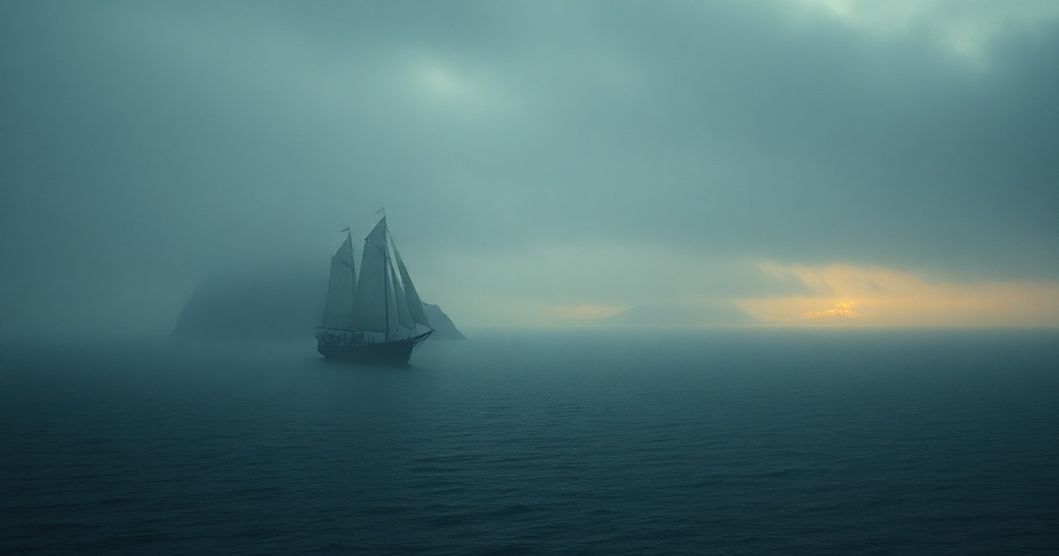Core Symbols: The Ship, the Islands, and the Horizon
In dreams of sailing past vampire islands toward distant vampire horizons, three key symbols emerge as emotional and psychological signposts. The sailing vessel itself represents your sense of agency and direction—whether you feel in control of your journey or adrift in life’s currents. A small sailboat, for example, might signal vulnerability, while a larger ship could reflect confidence in your ability to navigate challenges. The vampire islands, shrouded in mist or shadow, embody hidden threats or repressed parts of yourself you’ve avoided confronting. These aren’t literal dangers but emotional or psychological barriers: a job that drains your energy, a relationship that feels predatory, or a fear of aging or losing vitality. Finally, the 'vampire horizons'—those distant, glowing or darkly lit destinations—represent both allure and dread. They could symbolize goals you’re drawn to but fear (a new career, a relationship) or the future you sense but can’t quite grasp.
Consider a reader’s experience: 'I dreamed of a small boat approaching a jagged island with twisted trees, the shoreline glowing faintly red. I felt compelled to sail closer, though every instinct screamed to turn back. The islands’ edges blurred into the horizon, and I realized I couldn’t tell if I was fleeing or drawn to them.' This dream’s power lies in its ambiguity—the islands aren’t purely threatening, nor purely inviting, mirroring how real-life fears often carry a strange allure.
Psychology Lens: The Shadow, the Brain, and the Unconscious
Want a More Personalized Interpretation?
Get your own AI-powered dream analysis tailored specifically to your dream
🔮Try Dream Analysis FreeFrom a psychological perspective, vampire islands and horizons tap into deep-seated fears and the unconscious mind’s storytelling. Carl Jung’s concept of the shadow archetype offers insight: vampires often represent the 'shadow self'—parts of ourselves we reject, fear, or project onto others. The islands could be literalized shadow aspects: a trait you’ve suppressed (like anger or ambition) or a relationship dynamic that feels 'toxic' (vampire-like energy draining your life force).
Freud might interpret this dream through the lens of repressed desires and anxieties. The act of sailing toward a vampire horizon could symbolize unacknowledged longings—for power, freedom, or even danger—that your conscious mind avoids. Meanwhile, neuroscience reveals that during REM sleep, the brain processes emotional memories, often amplifying unresolved feelings into symbolic narratives. Your brain may be using vampire imagery to reprocess stress from recent emotional labor, social pressures, or uncertainty about life transitions.
Eastern traditions add another layer: in some mythologies, sailing represents the journey of life itself, and dark islands can signify karmic lessons or past traumas needing resolution. The horizon, then, becomes a threshold between the known and unknown—a common theme in spiritual dreamwork.
Life Triggers: When Do These Dreams Arise?
These dreams rarely occur in isolation; they’re often triggered by specific life moments or emotional states. If you’ve recently experienced burnout or emotional depletion, the 'vampire islands' might symbolize environments or relationships that drain your energy. A job change, breakup, or health scare can create this sense of 'sailing into the unknown,' making the horizon feel both dangerous and inevitable.
Career transitions often spark such dreams. If you’re leaving a stable role for uncertainty, the vampire islands could represent fears of failure or the unknown territory of self-employment. Similarly, relationship shifts—whether ending a partnership or entering a new one—can trigger this imagery as your subconscious processes identity shifts.
Consider someone navigating a midlife crisis: 'I’ve been feeling adrift since my promotion, and my dreams now show me on a boat with no destination, passing islands that feel like versions of my past selves—some familiar, some repellent. The horizon is just a blur of red and black, and I can’t tell if I’m moving forward or backward.' This reflects the existential uncertainty many face when life’s course shifts unexpectedly.
What To Do Next: Navigating the Dream’s Message
When these dreams appear, start with short-term reflection: keep a journal noting details—the boat’s size, the islands’ texture, the horizon’s color. Ask yourself: What emotions did I feel? Was I afraid, curious, or both? This helps you map which aspects of your life feel 'vampire-like'—energy-draining, controlling, or unknown.
For medium-term exploration, identify one 'island' in your life you’ve been avoiding. It might be a conversation, a habit, or a relationship. Take a tiny step toward it—send a message, have a difficult talk, or try a new hobby. This mirrors the dream’s sailing journey: moving from avoidance to engagement.
Long-term integration involves recognizing that 'vampire horizons' aren’t always threats. Sometimes they’re invitations. If the horizon feels alluring, ask: What do I want to create or explore? If it feels threatening, examine if you’re avoiding growth. Dreams of sailing to vampire horizons ultimately urge you to embrace the journey, not fear it—turning the shadow into a guide rather than a foe.
FAQ
Q: What does it mean if the vampire islands feel familiar? A: Familiar islands suggest unresolved past patterns or recurring emotions you haven’t addressed. They may represent old relationships, jobs, or self-beliefs that still drain you.
Q: Is this dream a warning about literal danger? A: No—dreams rarely predict literal threats. Instead, they reflect emotional or psychological states. The 'vampire' is more likely a metaphor for energy drains or fear of loss.
Q: How do I differentiate this from a nightmare about literal danger? A: Nightmares feel overwhelming and visceral, while this dream has a narrative flow. If you feel compelled to 'sail through' the islands rather than fleeing, it’s a call to process emotions, not a warning.
